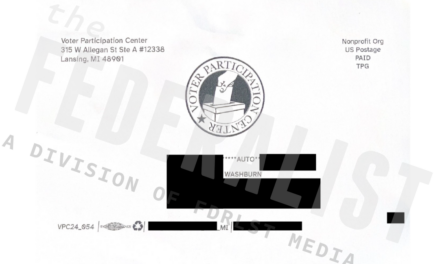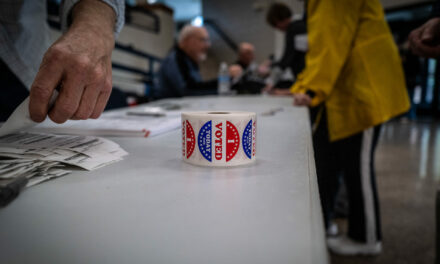We support our Publishers and Content Creators. You can view this story on their website by CLICKING HERE.
At least four Pennsylvania county election offices — Lancaster, York, Monroe, and Cambria — are setting aside suspicious and possibly fraudulent voter registration and mail-in ballot requests.
When Lancaster County Commissioners announced Friday they had received a load of potentially fraudulent voter registration requests, they mentioned two other counties had similar, ongoing investigations. Instead of naming them, Lancaster officials said they would let individual counties identify themselves.
In Lancaster, officials say, some 2,500 voter registration requests arrived last week in two large batches. Election workers noticed some had the same handwriting, many shared the same date, and some had other anomalies, officials said.
The county investigated and found 60 percent were confirmed as “fraudulent,” according to Lancaster County District Attorney Heather Adams. She said Lancaster County officials suspect the fraudulent applications are part of a “large-scale” operation that has been underway since June. It is not yet known who was behind the large batches of voting requests, officials said.
A Monroe County official told The Federalist Monday night that during its normal review of voter registration forms received in its office, Monroe County Board of Elections staff members “recently identified approximately 30 irregular forms.” Those forms have been segregated. The matter was referred to the Monroe County district attorney, whose office continues to investigate. The county would not answer further questions and said additional updates will be provided when available.
York County says it has also segregated a large number of voter registration and mail-in ballot requests for a closer look. York County Chief Clerk Gregory Monskie told The Federalist Monday that the county received a large batch of mixed voter registrations and mail-in ballot requests. Some are legitimate, he said. The county set them aside because they arrived in such a large batch.
“It’s unusual to receive that many things all at one time,” Monskie said. “When someone drops off several thousand documents, that is a little unusual.” He could not immediately say how many requests came in or who dropped them off.
He cautioned against using the word “fraud” to describe any ballots or voter registration forms, even if some prove to be illegitimate. Sometimes people who are already registered register again, not realizing they don’t need to register yearly, he said.
The York district attorney’s office has been “in constant contact with the York County Commissioners and board of elections regarding any potential irregularities they are seeing,” York District Attorney Chief Administrator Kyle King told The Federalist in a prepared statement. The D.A. is observing to see if further investigation is required by its office, and the York D.A.’s office says its policy is not to comment on specific matters.
Earlier this month, Cambria County announced a similar investigation that found 21 fraudulent voter registrations. The circumstances were similar, with the same handwriting and dates on many requests. There, investigators in the district attorney’s office found the address listed for some applicants was an empty lot. Others were homes where the occupants said they did not fill out voter registration requests.
The Federalist asked the Pennsylvania Department of State what counties are investigating for fraudulent registration and ballot requests, and asked if the department sent any guidance to counties about these large batches delivered to counties. The agency did not respond.
As of Oct. 21, Lancaster County has 114,199 registered Democrats; 185,018 Republicans (a difference of 70,819 between parties); and 63,321 registered voters not affiliated with a major party. The historic city of Lancaster has become increasingly Democratic. It has a large Hispanic population, including established immigrants who have arrived in recent years, started businesses, and assimilated to local culture.
Just outside Lancaster city limits, historic stone houses and barns dot the countryside. Some farms are still owned by families that settled the area before the Declaration of Independence was signed in 1776. The large population of Amish and Mennonites in Lancaster County are pacifists. Some who are not have ancestors who fought in the American Revolutionary War. These are conservative, Republican voters.
Neighboring York County has a similar history, with 99,238 Democrats; 170,667 Republicans (difference 71,429); and 58,260 other voters. The city of York is the birthplace of the Articles of Confederation and other notable historic American moments. Some of York’s historic row homes are now rundown housing.
In York, 25 percent of the population lives in poverty, according to federal statistics. There are some sketchy areas where crime flares. The city is 51 percent white; 34 percent Hispanic or Latino; and 23 percent black, U.S. Census records show. Out of the city, York has nearly 2,000 farms that produce mainly grains, poultry, beef, and dairy, according to USDA records.
Many Pennsylvania counties repeat this pattern of a large, Democratic city surrounded by rural Republican communities. Monroe County has 51,163 Democrats; 43,334 Republicans (difference 7,829); and 24,866 other registered voters. The mysterious swing voter has much power in Monroe County elections.
Just more than 70 miles from New York City, many New Jersey and New York natives have settled in Monroe County’s Pocono Mountains in recent decades, bringing in more Democrat voters than in the past.
Cambria has 31,697 registered Democrats; 46,580 Republicans (difference 14,883); and 9,872 other voters. Its largest city is Johnstown.
For more election news and updates, visit electionbriefing.com.
Beth Brelje is an elections correspondent for The Federalist. She is an award-winning investigative journalist with decades of media experience.

 Conservative
Conservative  Search
Search Trending
Trending Current News
Current News 





